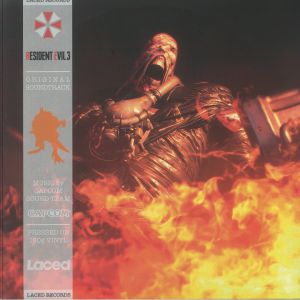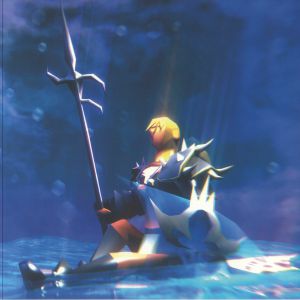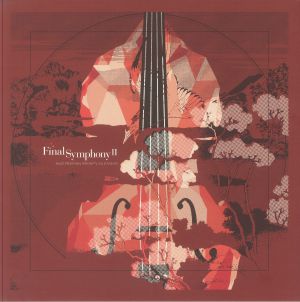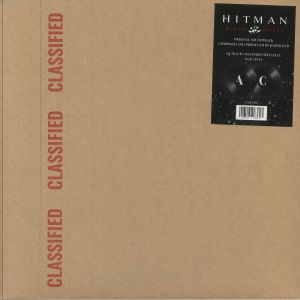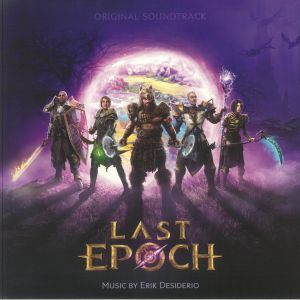Filter
All genres charts
Bestselling All genres vinyl
1~10/10(ページ1/1)の商品
Sekiro: Shadows Die Twice (Soundtrack) (180 gram vinyl 4xLP in slip-case)
Cat: LMLP 108. Rel: 15 Jan 21
Soundtracks
Review: RECOMMENDED
If 2020, and the coronavirus pandemic, did anything good for music it was forcing a long overdue reevaluation of the role technology plays. Video games had a bumper year, and it didn't take long for the historic relationship between computer entertainment and contemporary musical compositions to start finding favour with content-starved editorial teams.
They say there's no turning back, ever, and as such the smart money is on albums like Sekiro: Shadows Die Twice not just becoming more commonplace, but taken more seriously going forward. Soundtrack to Activision's critically acclaimed video game of the same name, in which players take on the role of a shinobi in feudal Japan, as you'd expect it's a deeply atmospheric collection that invokes misty mountaintops, shadows dancing off bamboo and patient heroics. An OST equal to any major movie.
… Read moreIf 2020, and the coronavirus pandemic, did anything good for music it was forcing a long overdue reevaluation of the role technology plays. Video games had a bumper year, and it didn't take long for the historic relationship between computer entertainment and contemporary musical compositions to start finding favour with content-starved editorial teams.
They say there's no turning back, ever, and as such the smart money is on albums like Sekiro: Shadows Die Twice not just becoming more commonplace, but taken more seriously going forward. Soundtrack to Activision's critically acclaimed video game of the same name, in which players take on the role of a shinobi in feudal Japan, as you'd expect it's a deeply atmospheric collection that invokes misty mountaintops, shadows dancing off bamboo and patient heroics. An OST equal to any major movie.
in stock $111.66
Resident Evil 3 (Soundtrack) (gatefold heavyweight vinyl 2xLP with obi-strip)
Cat: LMLP 144. Rel: 05 Sep 24
Soundtracks
Review: From the moment you hit play on 'A New Threat Is Born', the first few minutes on this soundtrack to the acclaimed video game, Resident Evil 3, you could easily close your eyes and feel like you're back sat in front of a TV playing the story through. If you're unfamiliar with the franchise, let's just say it (re)wrote the book on survival horror, and a big part of this was in the scores used to accompany the on-screen tension. Less focused on specific theme tunes and tracks, over time the emphasis has increasingly fallen on building atmosphere and setting up jump scares for unassuming players. On a record, that sounds like a combination of fast moving and quickly developing instrumental movements and intimidating sound effects. Perhaps not the dinner party soundtrack you were looking for, nevertheless it makes a big impact.
… Read more in stock $51.13
Review: Old school RuneScape players will love these nostalgic remixes by London producer Pizza Hotline who has a fine rep' for crafting video game-inspired drum & bass and jungle riddims. Here, beloved RuneScape tracks get reimagined to blend classic vibes with modern twists and the first up 'Garden' embraces a traditional style, while the iconic 'Sea Shanty 2' transforms into a minimal d&b banger. 'Autumn Voyage' slows things down with a breakbeat remix, and 'Shine' takes on an atmospheric edge while seemingly drawing inspiration from Aphex Twin. Made using hardware like a Roland JV-1080 and reverb effects inspired by the PS1, Pizza Hotline stays true to the golden age here.
… Read more in stock $51.13
Review: Final Symphony II delves deeper into the cherished melodies of the Final Fantasy series. Renowned composers Roger Wanamo and Jonne Valtonen skillfully craft rich and intricate arrangements of Nobuo Uematsu's iconic compositions from FF5, 8 & 9. Additionally, Masashi Hamauzu offers a captivating suite inspired by his monumental original score for Final Fantasy XIII, while Valtonen sets the tone with his atmospheric opening piece 'In a Roundabout Way - Fanfare'. Pianist Mischa Cheung shines brightly in the spotlight, captivating audiences with his masterful performances in 'For the People of Gaia' and the emotive solo arrangement 'You Are Not Alone'.
… Read more in stock $70.75
Review: In the right circles,, Martin O'Donnell and Michael Savatori are living legends. Working with the iconic US video game company Bungie Inc, the pair put their names on the map - or maybe maps? - by creating soundtracks to a number of high profile titles, either as a duo or individually. O'Donnell is arguably the better known, or at least has the bigger online persona, but both composers deserve plenty of credit. Halo: Combat Evolved was the first title in what is now a huge and genre-defining first person shooter franchise, and the score reflects the emergence of video game music as an integral part of the on-screen action. O'Donnell and Savatori's efforts to ensure instrumentation dramatically changed with events in the game, which is by nature relatively non-linear, was a revelation. While their efforts to separate these into individual suites foresaw the rise of playable stories as films in their own right.
… Read more in stock $45.61
Hitman: Blood Money (Soundtrack) (2xLP (soundfiles not available))
Cat: LMLP 187. Rel: 14 Nov 24
Soundtracks
Apocalypse
Secret Invasion
Before The Storm
47 Attacks
Hunter
Action In Paris
Amb Zone
Night Time In New Orleans
Vegas
Club Heaven
Invasion On The Mississippi River
Rocky Mountains
Day Light In New Orleans
Trouble In Vegas
Funeral
Main Title
Elevator Theme
Bloodmoney Trailer
Club Heaven
Review: Jesper Kyd may not be a 'household name', but once you've encountered the Danish composer and sound designer's work you're unlikely to forget who he is or what he is capable of. Largely self-taught, he began exploring composition at an early age, by 14 was composing on a Commodore 64 and then an Amiga, and later became a member of the audio-visual computer-based artist collective Silents DK, a demogroup. Soon after that, he was collaborating with the Crionics coders. Seemingly born into the world of video game development, but from a staunchly artistic perspective, to date he's created some of the most accomplished game scores we've encountered, and 2006's Hitman: Blood Money is among them. Recorded with the Budapest Symphony Orchestra, it's tense, building, grand and, even without the on-screen action, thoroughly captivating contemporary classical stuff.
… Read more in stock $43.40
Review: It's been a long time since Halo: Combat Evolved revolutionised the word of first-person shooter video games. Graphically superior to anything that had come before it, the franchise also benefits from a spectacularly gripping storyline in which humans are outgunned and out-teched by a ruthless and uncompromising alliance of superiorly equipped alien races united as The Covenant. The titular Halo adds a kind of Prometheus air of uncertainty, as nobody really knows what it does until attempts to activate the galaxy-destroying weapon reveal something worse than death - a parasitic breed called the Flood. If all that was enough to blow everyone away in 2001, 2004 brought us to a whole new level of immersion in this future scape. Just like its predecessor, a big part of the impact was the visionary score by gaming soundtrack masters Martin O'Donnell and Michael Savatori. Now here it is in all its Gregorian chanting glory.
… Read more in stock $63.85
Skull & Bones (Soundtrack) (gatefold heavyweight vinyl 2xLP)
Cat: LMLP 198. Rel: 25 Jul 24
Soundtracks
Review: Pirates have always had a pretty rough time in the land of video games. On the face of it, there's so much about bandits-on-the-waves that should work perfectly for a playable adventure. And yet so few have managed to really crack the formula, save for the likes of Assassin's Creed Black Flag and Sid Meier's standard-bearing Pirates. Enter Skull & Bones, a high spec 2024 release which - having reportedly spent the best part of a decade in development hell - really wants to change the sketchy track record. Sadly, it only partly manages it, with reviews pointing to a title that's "almost great", but not really. Nevertheless, the aesthetics and effects have been praised, as has the music. Created by Tom Holkenborg, AKA Junkie XL, while much of it is relatively bombastic classical stuff, there's more than a garnish of experimentalism, ambient and avant garde here, too.
… Read more in stock $50.31
Review: Bethesda Game Studios and Laced Records have teamed up to release the Starfield soundtrack on deluxe vinyl. Music is central to Bethesda's games and composer Inon Zur has worked with the studio since Fallout 3 in 2008. For Starfield, Zur crafted a blend of orchestral and electronic sounds to capture the vastness of space and human curiosity. Influences range from John Williams and Vangelis to Debussy and John Cage, and it was all recorded by the Budapest Film Orchestra. The score features sweeping melodies, cosmic textures and Aeralie Brighton's vocals which help bring it to life in HD sound.
… Read more in stock $37.17
Last Epoch (Soundtrack) (gatefold heavyweight vinyl 2xLP in spot-varnished sleeve)
Cat: LMLP 218. Rel: 19 Sep 24
Soundtracks
Review: Last Epoch is an action role playing game that's been picking up some serious commendations since it arrived early 2024. For one thing, critics have lauded the open nature of its 'skill trees', which effectively means players can create characters with an entirely bespoke balance of talents and abilities, surpassing the vast majority of other titles in this genre. Others have praised the look of the title, with vivid detailing helping set the scene of this time travelling adventure. But what about the music? Well, for one thing Eric Desiderio has certainly embraced the atmosphere and the idea of Last Epoch. These tunes are epic, grand, transportive, ancient and futuristic all at the same time. It's an odyssey in itself, and one that really does elevate the overall playing experience. For some, that might be just enough to own a standalone copy of the score, too.
… Read more in stock $50.59
1~10/10(ページ1/1)の商品

 USD
USD







